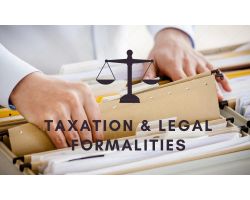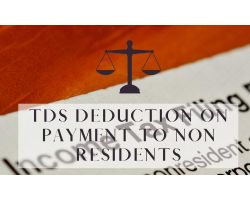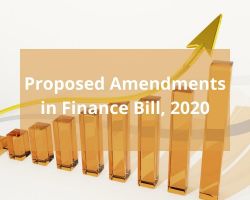Introduction
For freelancers and self-employed professionals in India, tax planning is not just a financial chore; it's a strategic advantage. Unlike salaried employees, you have the autonomy to structure your income and expenses to minimize your tax liability legally. In this blog, we'll explore the art of tax planning tailored specifically for freelancers and self-employed professionals.
Income Projection and Estimation
The foundation of effective tax planning lies in accurate income projection. Estimate your annual income realistically, factoring in all revenue streams, including client payments, consultation fees, and any other sources of income. This projection will serve as the basis for your tax calculations and planning. Various sections of the Income Tax Act are relevant to income projection and estimation:
- Section 28 - Profits and Gains of Business or Profession: This section defines what constitutes income from business or profession and includes income from all sources connected with your business.
- Section 29 - Income From Profits and Gains of Business or Profession, How Computed: This section outlines the rules for computing income from business or profession, taking into account deductions and allowances.
- Section 44ADA - Presumptive Taxation for Professionals: Professionals with gross receipts up to a certain limit can opt for presumptive taxation under this section, which simplifies income estimation.
Appropriate Business Structure
Choosing the right business structure can significantly impact your tax liability. Freelancers and professionals in India can opt for sole proprietorships, partnerships, or limited liability partnerships (LLPs).
- Sole Proprietorship:
- Description: A sole proprietorship is the simplest form of business, where an individual conducts business in their own name or under a trade name.
- Taxation: Income from the business is taxed as the individual's personal income.
- Partnership Firm:
- Description: A partnership firm is formed when two or more individuals come together to run a business and share profits and losses.
- Taxation: A partnership firm is a separate legal entity, but its income is taxed in the hands of the partners.
- Limited Liability Partnership (LLP):
- Description: An LLP combines the flexibility of a partnership with limited liability for its partners. It is a separate legal entity.
- Taxation: LLPs are taxed at the entity level, and partners are taxed on their share of profits.
- Private Limited Company:
- Description: A private limited company is a separate legal entity with limited liability for its shareholders.
- Taxation: The company's income is taxed at the corporate tax rate, and shareholders are taxed on dividends received.
Maintain Detailed Records
Accurate record-keeping is your tax planning cornerstone. Organize invoices, receipts, and financial statements efficiently. This practice not only simplifies tax filing but also provides a clear overview of your financial health.
Why Maintain Detailed Records:
- Income Estimation: Detailed records help you track all sources of income, including invoices, receipts, and payment records. This is essential for accurately estimating your taxable income.
- Deductions and Expenses: Maintaining records of business expenses, receipts, and invoices allows you to claim legitimate deductions, reducing your tax liability.
- Compliance: The Income Tax Act, 1961, mandates that taxpayers maintain proper books of accounts and documents. Failure to do so can result in penalties and legal issues.
- Audit Preparedness: In case of an audit by the tax authorities, detailed records serve as evidence to support your income and expense claims.
Relevant Rules, Regulations, and Sections:
- Income Tax Act, 1961:
- Section 44AA - Maintenance of Books of Accounts: This section prescribes the rules for maintaining books of accounts for certain professionals, including the minimum income threshold that triggers the requirement for bookkeeping.
- Section 44AB - Tax Audit: If your total gross receipts exceed the specified limit, you may be required to undergo a tax audit. Proper records are vital in such cases.
- Goods and Services Tax (GST):
If your business is registered under the GST regime, you must maintain records related to GST transactions, including invoices, returns, and input tax credit reconciliation.
- Bank Statements:
Maintain records of your bank statements, which provide a clear trail of your business transactions, including income and expenses.
- Invoices and Receipts:
Keep copies of invoices issued to clients and receipts for payments received. Ensure they contain all required details as per GST and income tax regulations.
- Expense Documentation:
Maintain receipts and invoices for all business expenses, such as rent, utilities, office supplies, travel, and professional fees.
- Salary and Wages:
If you have employees or hire subcontractors, keep records of salaries, wages, and payments made to them.
- Asset Records:
Maintain records of assets acquired for your business, including details of purchase, depreciation, and disposal.
- Digital Records:
Electronic records are also acceptable, provided they are maintained in a secure and accessible format. Backup digital records regularly to prevent data loss.
Deductions and Exemptions
Utilize available deductions and exemptions to your advantage. Under Section 80 of the Income Tax Act, there are several deductions that freelancers and self-employed professionals can claim. These may include deductions for business-related expenses, insurance premiums, and contributions to retirement funds. Here's a list of deductions:
- Section 80C - Deduction for Investments:
Under Section 80C, you can claim deductions for various investments and expenditures, such as:
- Life insurance premiums
- Employee Provident Fund (EPF) contributions
- Public Provident Fund (PPF) contributions
- National Savings Certificates (NSC)
- Equity-linked savings schemes (ELSS)
- Principal repayment of a home loan, etc.
The maximum deduction available under Section 80C is Rs. 1.5 lakh per financial year.
- Section 80D - Deduction for Health Insurance Premiums:
- You can claim deductions for premiums paid on health insurance policies for yourself, your family, and your parents.
- The deduction limit depends on the age of the insured persons, with higher limits for senior citizens.
- Section 80G - Deduction for Donations:
- If you've made donations to eligible charitable organizations, you can claim deductions under Section 80G.
- The allowed deduction varies based on the type of charity and the percentage of the donated amount.
- Section 80GG - Deduction for Rent Paid:
If you are a self-employed professional living in a rented house and not receiving House Rent Allowance (HRA), you can claim a deduction under Section 80GG for the rent paid.
- Section 80E - Deduction on Education Loan Interest:
If you've taken an education loan for higher studies, you can claim a deduction on the interest paid under Section 80E.
Advance Tax Payments
Unlike salaried individuals, freelancers and self-employed professionals are responsible for paying advance tax. Calculate your tax liability regularly and make installment payments to avoid penalties and interest charges.
GST Compliance
If your annual turnover exceeds the GST threshold, consider registering for Goods and Services Tax (GST). Proper GST compliance is essential for avoiding legal issues and enhancing your professional credibility.








1128 Likes